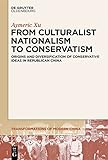From Culturalist Nationalism to Conservatism : Origins and Diversification of Conservative Ideas in Republican China / Aymeric Xu.
Material type: TextSeries: Transformations of Modern China ; 4Publisher: München ; Wien : De Gruyter Oldenbourg, [2021]Copyright date: ©2021Description: 1 online resource (X, 264 p.)Content type:
TextSeries: Transformations of Modern China ; 4Publisher: München ; Wien : De Gruyter Oldenbourg, [2021]Copyright date: ©2021Description: 1 online resource (X, 264 p.)Content type: - 9783110739909
- 9783110740264
- 9783110740189
- 320.520951 23
- JC573.2.C5 X83 2021
- online - DeGruyter
- Issued also in print.
| Item type | Current library | Call number | URL | Status | Notes | Barcode | |
|---|---|---|---|---|---|---|---|
 eBook
eBook
|
Biblioteca "Angelicum" Pont. Univ. S.Tommaso d'Aquino Nuvola online | online - DeGruyter (Browse shelf(Opens below)) | Online access | Not for loan (Accesso limitato) | Accesso per gli utenti autorizzati / Access for authorized users | (dgr)9783110740189 |
Diss. University of Edinburgh 2019.
Frontmatter -- Acknowledgements -- Note on Romanization -- Contents -- List of Illustrations -- Introduction -- 1 Conservatism: An Idea Rooted in the Present -- 2 Culturalist Nationalism from the 1890s to the 1900s -- 3 From Culturalist Nationalism to Nationalist Conservatism -- 4 Liberal Conservatism and Anti-modern Conservatism (mid-1910s‒1930s) -- 5 Philosophical and Authoritarian Conservatism (1920s‒1940s) -- Conclusion -- Annex -- Bibliography -- Glossary -- Index of Persons -- Index of Subjects
restricted access online access with authorization star
http://purl.org/coar/access_right/c_16ec
What does it mean to be a conservative in Republican China? Challenging the widely held view that Chinese conservatism set out to preserve traditional culture and was mainly a cultural movement, this book proposes a new framework with which to analyze modern Chinese conservatism. It identifies late Qing culturalist nationalism, which incorporates traditional culture into concrete political reforms inspired by modern Western politics, as the origin of conservatism in the Republican era. During the May Fourth period, New Culture activists belittled any attempts to reintegrate traditional culture with modern politics as conservative. What conservatives in Republican China stood for was essentially this late Qing culturalist nationalism that rejected squarely the museumification of traditional culture. Adopting a typological approach in order to distinguish different types of conservatism by differentiating various political implications of traditional culture, this book divides the Chinese conservatism of the Republican era into four typologies: liberal conservatism, antimodern conservatism, philosophical conservatism, and authoritarian conservatism. As such, this book captures – for the first time – how Chinese conservatism was in constant evolution, while also showing how its emblematic figures reacted differently to historical circumstances.
Issued also in print.
Mode of access: Internet via World Wide Web.
In English.
Description based on online resource; title from PDF title page (publisher's Web site, viewed 28. Feb 2023)


